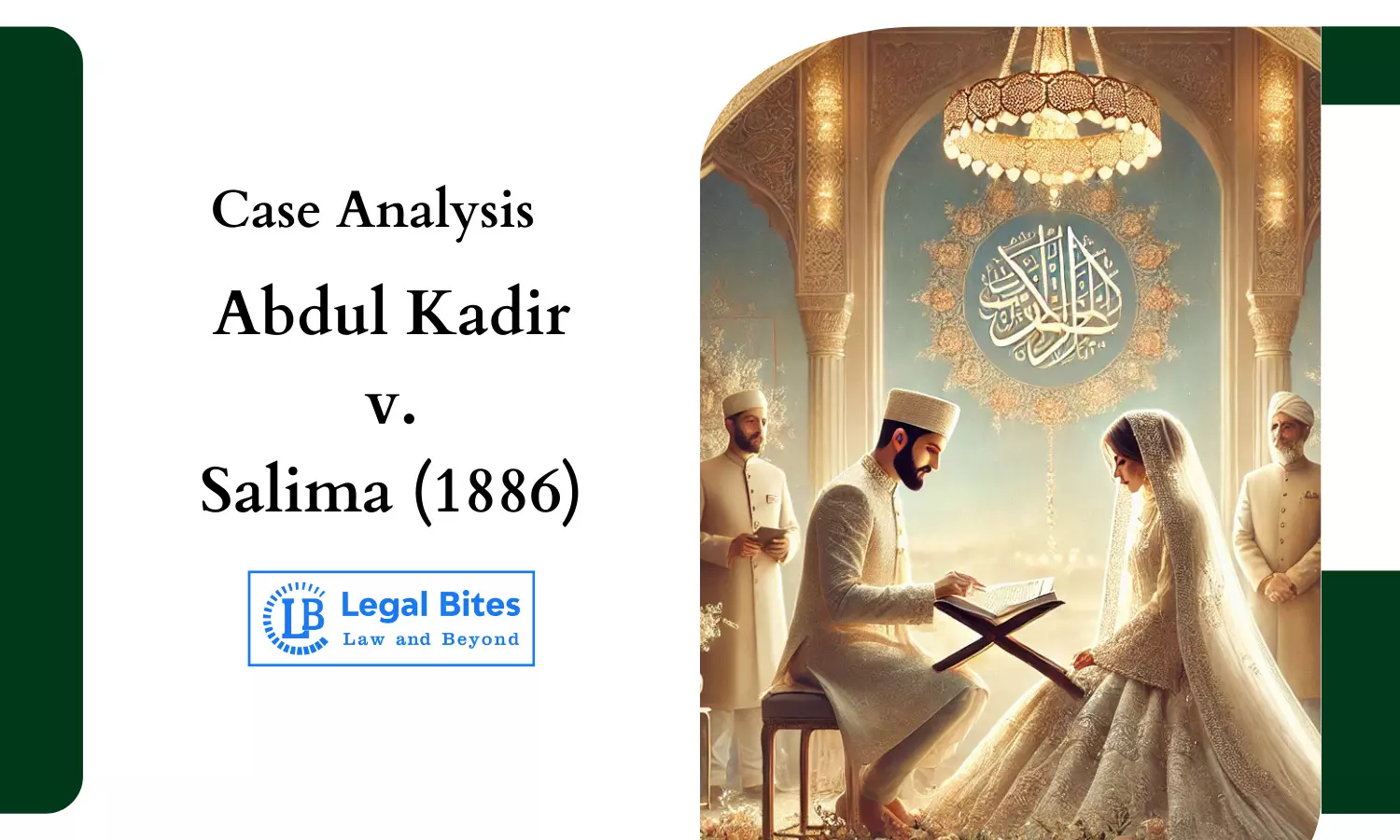Case Summary: Abdul Kadir v. Salima (1886) | Dower Case
The case of Abdul Kadir v. Salima (1886) is a landmark decision that examines the interplay between the payment of dower and the restitution of conjugal rights.

This case was referred to a Full Bench on March 26, 1885, to address a significant question under Muhammadan law concerning the rights and obligations arising from marriage, particularly regarding restitution of conjugal rights and the payment of dower. The judgment delivered by Justice Mahmood comprehensively examines the contractual nature of marriage under Islamic law and the associated rights of the husband and wife.
Case Title: Abdul Kadir v. Salima (1886)
Court: Allahabad High Court (Full Bench)
Citation: (1886)ILR 8 ALL149
Facts of the Case
Abdul Kadir, the plaintiff, filed a suit for restitution of conjugal rights against his wife, Salima (defendant). Salima refused to cohabit with him, asserting that her claim for unpaid dower provided her the right to deny conjugal relations. The lower appellate court ruled against Abdul Kadir, stating that his failure to pay the prompt dower precluded his claim for conjugal rights. Abdul Kadir appealed this decision.
Key Issues
- Whether marriage under Muhammadan law is a civil contract and what legal consequences arise from it.
- Whether a wife’s claim for unpaid prompt dower allows her to deny cohabitation with her husband.
Judgment
Justice Mahmood, delivering the opinion of the Full Bench, provided an in-depth analysis of the relevant legal principles and answered the referred question affirmatively, holding that the husband’s claim for restitution of conjugal rights was valid even in the absence of prompt payment of dower, subject to specific conditions.
Legal Analysis
1. Marriage as a Civil Contract:
Justice Mahmood emphasized that under Muhammadan law, marriage is a civil contract with contractual obligations arising from mutual consent ("eejab-o-kubool" or proposal and acceptance). Although solemnized with religious elements, its legal character remains contractual, and the consequences flow directly from the completion of the contract.
2. Nature of Dower (Mahr):
Dower is a mandatory payment by the husband to the wife, signifying respect. It can be:
Prompt: Payable immediately upon demand.
Deferred: Payable upon dissolution of marriage (divorce or death).
The non-payment of prompt dower does not invalidate the marriage or automatically negate the husband’s rights to cohabitation, though it gives the wife a legal claim to demand payment.
3. Wife’s Right to Deny Cohabitation:
The court analyzed texts from authoritative sources like the Hedaya, Fatawa-i-Alamgiri, and Durrul Mukhtar to determine that:
- A wife may deny cohabitation until her prompt dower is paid.
- This right, akin to a lien in a sale transaction, is a tool to secure dower payment but does not extinguish the husband’s marital rights.
The opinion of Imam Abu Hanifa (that the wife retains this right even after consummation) was contrasted with that of his disciples, Qazi Abu Yusuf and Imam Muhammad, who held that consummation negates this right. Justice Mahmood preferred the majority view, emphasizing that marital obligations are reciprocal and simultaneous.
4. Judicial Precedents:
The court reviewed case law, including decisions in Sheikh Abdool Shukkoar v. Raheem-oon-nissa and Wilayat Husain v. Allah Rakhi, which favoured the wife's right to deny cohabitation for unpaid dower. However, Justice Mahmood disagreed with these rulings, reasoning that such interpretations created unnecessary litigation and deviated from the principles of Muhammadan jurisprudence.
5. Restitution of Conjugal Rights:
The court held that a suit for restitution of conjugal rights is maintainable under Muhammadan law and aligns with procedural provisions in the Civil Procedure Code. Such suits involve considerations of equity and justice, ensuring the wife’s safety and dignity while addressing her financial claims.
Justice Mahmood concluded that:
- The husband’s right to cohabitation arises immediately upon marriage.
- The wife’s refusal to cohabit for unpaid prompt dower constitutes a defence but does not negate the husband’s claim. Such defences must be addressed equitably, often through conditional decrees.
- The prompt dower becomes exigible only upon demand, and refusal to cohabit without prior demand weakens the wife’s defence.
In this case, Salima had not demanded her dower prior to the suit. Abdul Kadir’s deposit of the dower during litigation satisfied the obligation, rendering his claim valid. The decree of the lower appellate court was overturned, and the plaintiff’s suit was allowed.
Conclusion
This judgment clarifies key aspects of Muhammadan law: It reinforces the contractual nature of marriage. It highlights the reciprocal rights and obligations of spouses. It underscores the balance between personal laws and equitable judicial interventions. The case remains a landmark decision, illustrating the nuanced application of Islamic jurisprudence within the framework of Indian civil law.

